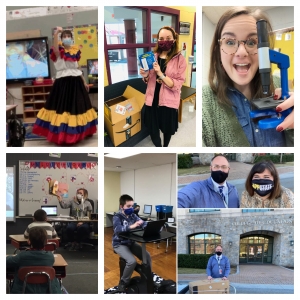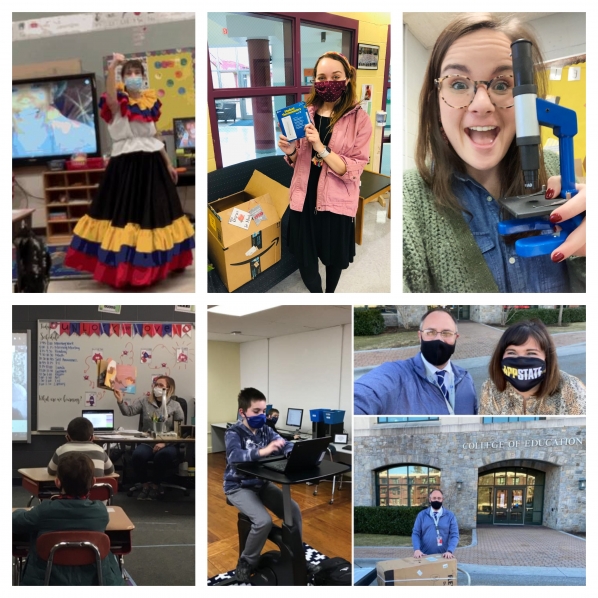The Reich College of Education's (RCOE) Public School Partnership Mini-Grants Committee has just completed the distribution of fall 2020 awards and materials to grant recipients. Last semester, 21 applications were received, and the committee funded eight of them.
The Partnership Mini-Grants are intended to build relationships between Appalachian State faculty members and partnering districts. This is done by engaging in collaborative projects involving internships, student teaching, professional development, and student learning. Partnership districts include Avery County, Ashe County, Alleghany County, Alexander County, Caldwell County, Burke County, Watauga County, Wilkes County, Elkin City, Newton-Conover City, North Carolina School for the Deaf, and App State Academy at Middle Fork.
“These grants are important in that they assist educators in building on each others' strengths,” said Dr. Betsy Rosenbalm, Director of Public School Partnership. “The grants also provide opportunities for students and educators to explore new concepts, gain new skills, and benefit from new resources.”
“These grants are important in that they assist educators in building on each others' strengths,” said Dr. Betsy Rosenbalm, Director of Public School Partnership. “The grants also provide opportunities for students and educators to explore new concepts, gain new skills, and benefit from new resources.”
The committee is currently evaluating applications for spring 2021 award recipients. The results and details for the spring mini-grants will be announced in April.
Fall 2019 Projects
I Sing the Story of Myself: Children’s Literature as a Curricular Opportunity for Music Learning and SEL Growth (Children's Literature in the Music Classroom)
Award Amount: $525.34
Recipients: Mazie Sullivan, music teacher at Westwood Elementary (Ashe County); Dr. Katherine Strand, professor in the Hayes School of Music
Project Abstract: Children's literature provides music teachers with opportunities to create wonderful musical learning opportunities. For example, a book may be “orchestrated” with sound effects performed with classroom instruments. The book may provide characters for students to create leitmotifs (e.g., Star Wars) and action to perform those motifs in various ways through the story (like Peter and the Wolf). The book may investigate topics that correspond to individual musical concepts such as dynamic levels, tempo, or ABA form that can be explored by “performing” the literature, or the book may explore parts of speech (e.g., adverbs) ripe for musical exploration (e.g., playing a rhythm in ways described by the adverbs). In this project, we plan to purchase children’s literature and use it to develop and implement curricular materials that engage elementary music students in musical creativity, skill and knowledge development in conjunction with language fluency and SEL learning. We will research children’s literature that addresses SEL topics of self-awareness, self-management, responsible decision-making, relationship skills, and social awareness. We will analyze these books for the opportunities to create musical and language learning and purchase dual copies (one for the public school and one for the university) of appropriate texts. For each purchased book we will create a curricular unit and purchase simple manipulatives to enhance student learning (e.g., scarves, small props). This project will serve as a professional development opportunity for the project partners and will be shared as professional development for the preservice music teachers and the profession at large.
Wild and Wonderful Weather Watchers (Hands-on Weather Unit in Second Grade)
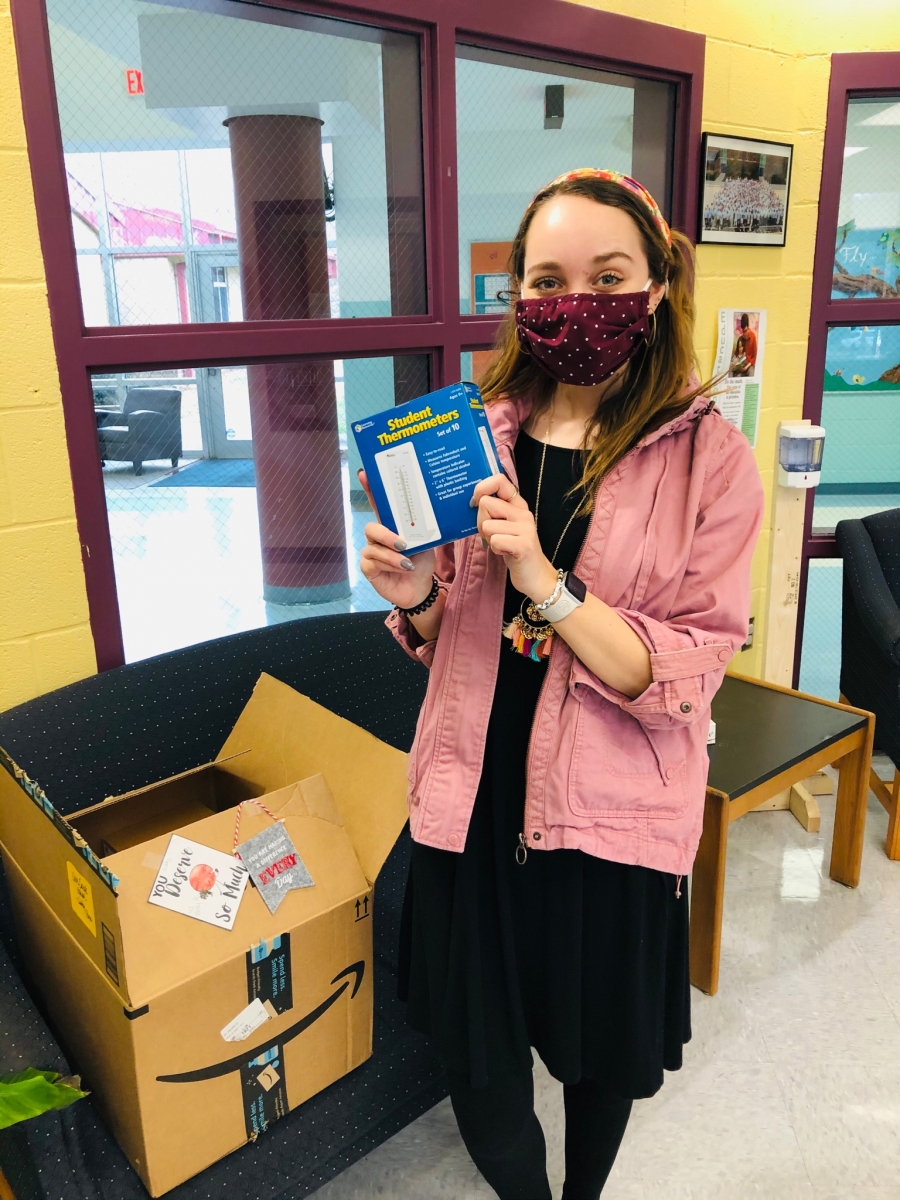
Award Amount: $400.33
Recipients: Libby Rose, second grade teacher at Cove Creek School (Watauga County)
Project Abstract: As second graders, my students study weather and its patterns as related to 2.E.1. In particular, standard 2.E.1.4 looks at specific tools that meteorologists and scientists use to study weather and patterns. We look at how the sun impacts weather, weather conditions as related to precipitation, wind speed, and temperature, and how patterns of weather change over time.
The purpose of this grant would be to turn these standards tangible. I would purchase the following weather tools: thermometer (two), wind vanes (two), windsock (eight), rain gauge (four), anemometer (12), and barometer (two). In having these tools at our ready, students could see how scientists use these tools while becoming meteorologists themselves! After direct instruction, second graders would spend time outside to use these tools on their own. I would model how to appropriately use the tools before letting the students practice on their own in various groups.
During my own time at Appalachian, I had a very similar experience with Dr. Rachel Wilson's Block Two science methods course. We watched weather patterns, and then went outside to practice our hand at using various tools. It is still one of my favorite memories to reflect on from Block Two. The hands-on perspective and ability to touch, feel, and play with the tools were much more impactful due to learning how to use them all on my own.
Building a Dual Language Library and Supporting its Use (Bilingual Library in Elementary School)
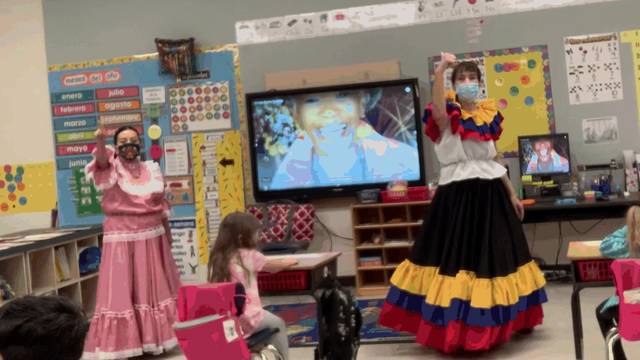
Award Amount: $600.00
Recipients: Dr. Rebecca Jordan, assistant professor in the Reich College of Education; Dysnora Morillo, Kindergarten Dual Language Immersion Teacher (Elkin City; Dr. Cynthia Altemueller, Chief Academic Officer (Elkin City)
Project Abstract: Dr. Rebecca Jordan will identify bilingual books that are developmentally appropriate for kindergarteners and will provide professional development on how to use these books to support the goals of the teacher, school, and district. The recipient of this professional development will be the current teacher and teacher assistant though the books will benefit the classroom and both current and future students for years to come. The support will begin by first inventorying the current classroom library and its use by children (as determined via book checkout, teacher interview, and/or observation). The teacher’s reflection on her own needs and how Dr. Jordan can best support her will be ascertained before beginning any professional development so her own wants and needs can be taken into account to personalize the coaching. From this self-report, Dr. Jordan will provide professional development and ongoing instructional coaching to the teacher and serve as a resource to support her in engaging students with these books to develop their own enjoyment and engagement with texts as well as their own oral and written narratives. Examples of likely purchases include bilingual book sets from School Specialty (https://www.schoolspecialty.com/childcraft-bilingual-books-grades-prek-to-k-set-of-12-1497002; https://www.schoolspecialty.com/school-specialty-primary-bilingual-collections-1497036; https://www.schoolspecialty.com/classroom-library-bilingual-board-books-1575110; totaling approximately $300 including tax and shipping for 30 books); a Spanish board book collection from Lakeshore Learning (https://www.lakeshorelearning.com/products/p/RA258; totaling approximately $80 including tax and shipping for 8 books); and a Dual Language Levels A-C Collection from Lee and Low Books (totaling approximately $600 for 100 books). Throughout the support provided, Dr. Jordan will monitor the use of the classroom library and may seek interviews with the teacher, teacher assistant, and students on ways they engage with the books. Family surveys may also be sought to determine any home effects of the increasingly robust classroom library since part of the professional development will focus on ways to engage families with literacy learning at home. The effectiveness of this mini-grant will be determined by teacher and students’ responses through interviews, family surveys, and any changes in classroom library use by the teacher and students.
Thank You, Omu! School-wide Reading Celebration; School-wide Literature Appreciation
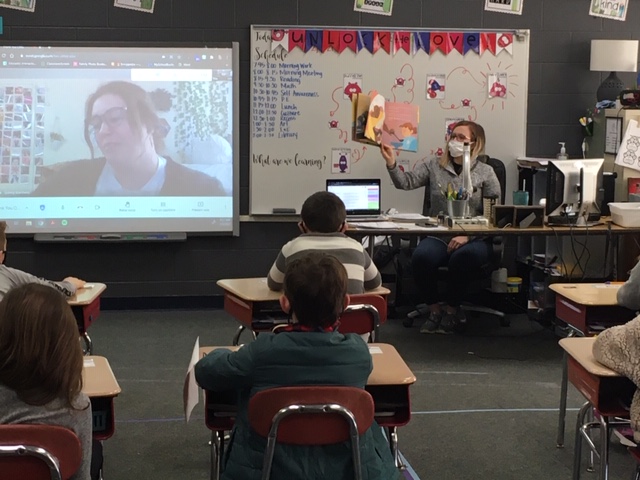
Award Amount: $400.00
Recipients: Jane R. Brown, media specialist at Valle Crucis School (Watauga County); Appalachian State University staff and pre-service teachers
Project Abstract: This proposal is for a schoolwide literature appreciation and community building event at Valle Crucis School in the days leading up to the Thanksgiving holiday, which would also involve Appalachian State Faculty and pre-service teachers who would be paired with classrooms for virtual visits. This project will include our Watauga Virtual Academy Classes. As partners, these groups will read the engaging and joyful picture book Thank you, Omu! By Oge Mora, (Little, Brown 2018) and may also collaborate on related activities after reading. The idea for this project occurred to me recently when I read this book to first-graders who were so captivated by it that they suggested I buy enough copies for our school so that everyone could read it! I agreed that it is a perfect story to share with all ages.
Required supplies are 25 books for homerooms @ $19.00 per copy, plus additional copies for all Appalachian State partner (virtual) visitors. Classroom teachers and their partner readers will all receive copies of the book ahead of time to help them plan for the event. Participants may keep (or return their books, if not wanted) at the conclusion of the project.
Art in Reading & Emotional Stability
Award Amount: $460.00
Recipients: Liz Cronan, fifth grade teacher at Sugar Loaf Elementary School (Alexander County); Dr. Jennifer R. Luetkemeyer, Assistant Professor in the Reich College of Education
Project Abstract: The purpose of this grant is to introduce art techniques in the form of visual journaling to improve the emotional stability of my students and increase their cognitive reading skills. The journaling will tie into concepts of reading comprehension through the use of the Fangbone series graphic novels as well as each student's present emotional needs. This project will also introduce students to a college professor, Dr. Jennifer Luetkemeyer. Students will participate in virtual or in-person lessons jointly taught. It has become evident, especially due to the COVID situation, that students are not dealing with the trauma they are experiencing. Research demonstrates that drawing will encourage students to release some of their conflicts. Also, struggling readers demonstrate greater understanding and willingness to read when given graphic novels. This project ties both of these needs together.
The Best of What's Around: Developing a Virtual Practicum Experience with Local Special Education Teachers (SPED Practicum Module Stipends)
Award Amount: $500
Recipients: Dr. David Peyton, Assistant Professor in the Reich College of Education; Angela Brock & Hunter Lloyd, Special Education teachers at Watauga High School (Watauga County)
Project Abstract: The purpose of this project is to develop a practicum module that can be developed and facilitated virtually to support special education candidates in this time of COVID-19. We know that teacher candidates benefit greatly from high-quality field experiences that feature exceptional teachers. Our intent is to leverage the recognized expertise of local special education teachers in the Watauga School District, specifically, Watauga High School. We will capture the instruction of two special education teachers over a span of five lessons and use a structured observation protocol to analyze their practices through our Go-React software. In addition, teachers will sit for a Q & A with candidates at the end of the experience to explain their instructional approaches & answer lingering questions from the practicum analysis. Ideally, being in the field is the most desirable option, however, this project provides us with a unique opportunity for a shared experience between candidates. We posit that this approach will extend the rich discussions that have begun in the block classes into the practicum experiences.
Dynamic Digital Lives (Flexispot Desk Bikes)
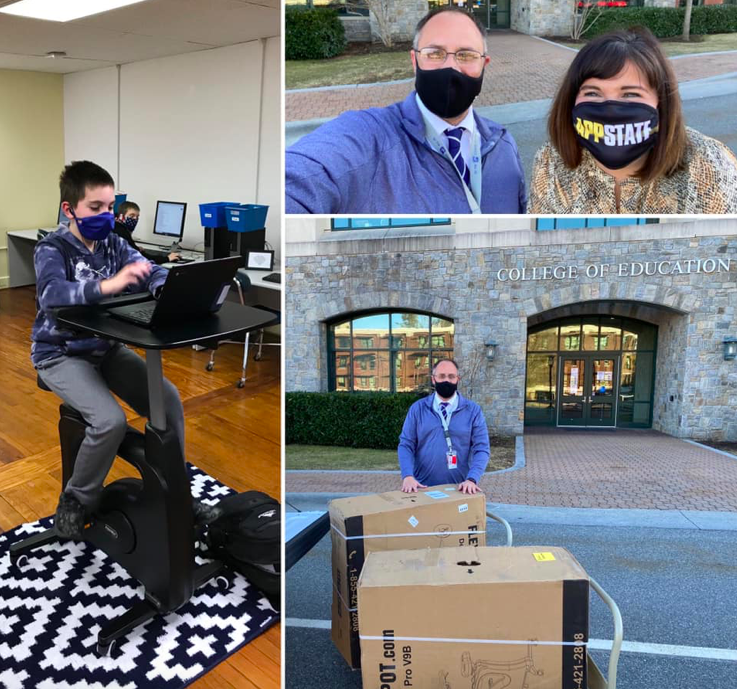
Award Amount: $500 or two bikes
Recipients: Michelle Griffin, Instructional Technology Facilitator at Bethel School (Watauga County); Kelly Young RN, BSN, School Nurse at Bethel and Mabel Schools (Watauga County)
Project Abstract: Our world has evolved into a place in which we are all connected by technology. While this has many advantages, one disadvantage is that many people are living very sedentary lives. Since the onset of COVID-19, many children have been bound to a computer to be able to continue getting an education. I would like to help students see that we can do the necessary tasks before us on our devices and still keep moving to maintain a healthy lifestyle. To start this unit of study for Bethel’s students, I would like to purchase three Flexispot Cycle Desk Bikes for students to use while using computers in Computer Skills class. I will partner with the school nurse to teach children about healthy eating habits and maintaining an active lifestyle. We will use resources from Eat Smart Move More NC and other materials as needed to teach the concepts. We will invite guest speakers to speak with the children about these topics as well. Over time, we will purchase more equipment to transform the computer lab into an active space where classes can do research and learn new skills. I will show the teachers how they can transform their classrooms as well and provide the teachers with training and resources to promote movement in their classrooms. This grant would enable me to make a small step to make big changes in our environment.
Microscopes on the Move (Shinco Scopes for STEM Exploration)
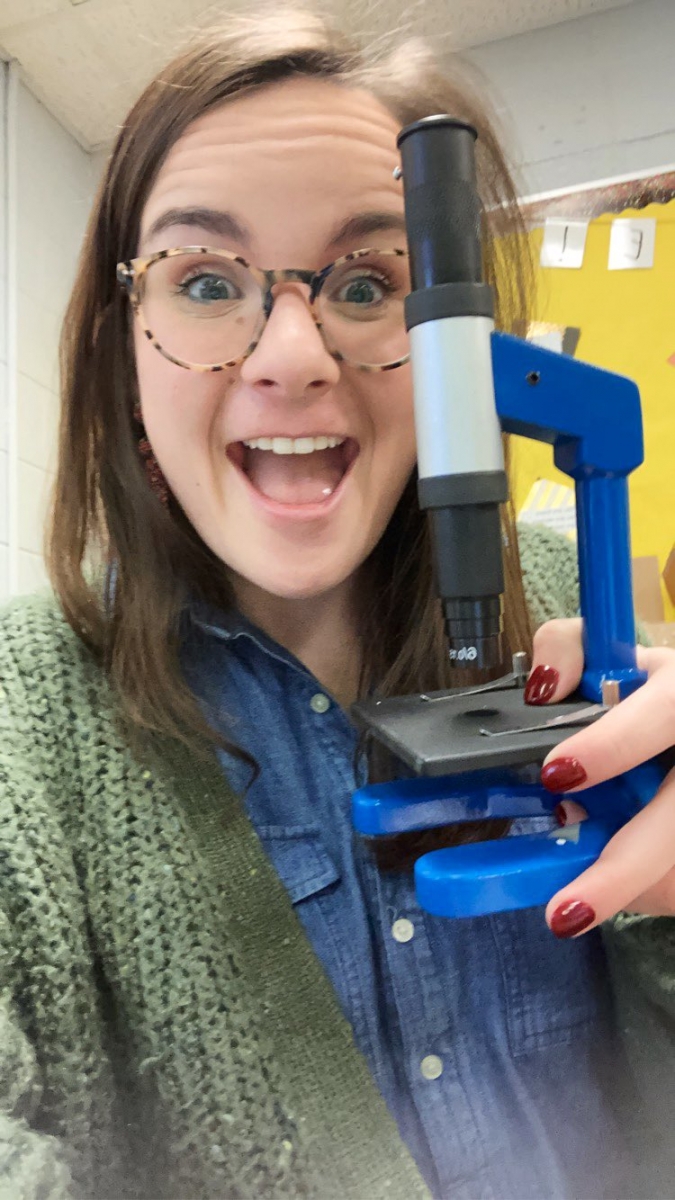
Award Amount: 5 microscopes or $500.00
Recipients: Audrey Jones, seventh grade teacher at Parkway School (Watauga County)
Project Abstract: To cultivate exploration and relevance within the science classroom, utilizing Shinco® Scope would provide students the opportunity to have a hands-on experience with microscopes outside of a laboratory setting. The Shinco® Scope does not utilize electricity, lamps, or mirrors but provides students the opportunity to have an in-depth understanding of the world around them. In partnership with Dr. Chris Cook, Professor of Middle Grades Education, seventh grade students would be provided experience with STEM and 21st-century skill education. STEM and 21st Century skill applications would coincide with the North Carolina Standard Course of Study and the Next Generation Science Standards.
Furthermore, when studying fossils and ecology, students are afforded the ability to use the environment as a classroom. When studying plant and animal cells, the Shinco® Scope would serve as a scaffold before utilizing a laboratory microscope with lamps and mirrors to adjust. Continuing the development of analysis skills, critical thinking, and problem-solving in young adolescence creates a pathway for future use of skills and technology beyond the school building. Students are fostering cognitive development and social development by collaborating with peers and educators. Beginning our classroom set with ten Shinco® Scopes would provide a fundamental step in educating the whole child through meaningful and engaging STEM activities. Conclusively, the project will open pathways for accessibility and creativity within STEM subjects in a general academic classroom.
Contributed by Alex Peoples
